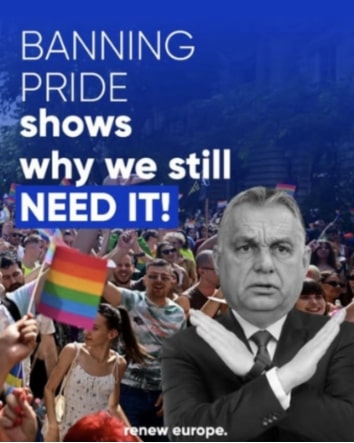
© Facebook Budapest Pride
У Будапешті вибухнула хвиля суспільного обурення після заборони цьогорічного маршу Budapest Pride, накладеної на підставі нового закону про «захист дітей». Попри рішення поліції, мер столиці закликає провести ходу в форматі «міського маршу», не відмовляючись від права громади на публічне висловлення своїх поглядів. Міжнародна реакція не забарилася: понад 30 посольств, серед яких країни ЄС, Канади та Австралії (але не США), виступили на підтримку організаторів події. Президентка Єврокомісії Урсула фон дер Ляєн закликала угорську владу гарантувати безпечне й вільне проведення маршу, підкреслюючи важливість дотримання основоположних прав. Правозахисні організації та ЛГБТІК+ активісти наголошують, що подібні заборони є частиною ширшої політичної кампанії перед парламентськими виборами 2026 року. Вони застерігають про систематичний тиск на спільноту, що має на меті звузити громадянські свободи під прикриттям «моральних норм».Ця ситуація стала новим етапом у конфлікті між угорською владою та європейськими структурами щодо прав людини, свободи самовираження та верховенства права.
The Fight for Budapest Pride Continues Despite Ban
A wave of public outrage has swept through Budapest following the ban on this year’s Budapest Pride march, imposed under a new “child protection” law. Despite the police decision, the city's mayor is urging citizens to proceed with the event in the form of a “city march,” standing firm on the community’s right to publicly express its views. The international response was swift: over 30 embassies — including those of EU countries, Canada, and Australia (but notably not the United States) — voiced support for the organizers. European Commission President Ursula von der Leyen called on the Hungarian authorities to ensure that the march can take place safely and freely, emphasizing the importance of upholding fundamental rights. Human rights groups and LGBTQ+ activists warn that the ban is part of a broader political campaign ahead of Hungary’s 2026 parliamentary elections. They caution against growing pressure on the community, carried out under the guise of enforcing “moral standards,” with the goal of curtailing civil liberties. The situation marks a new chapter in the ongoing conflict between the Hungarian government and European institutions over human rights, freedom of expression, and the rule of law.

1131